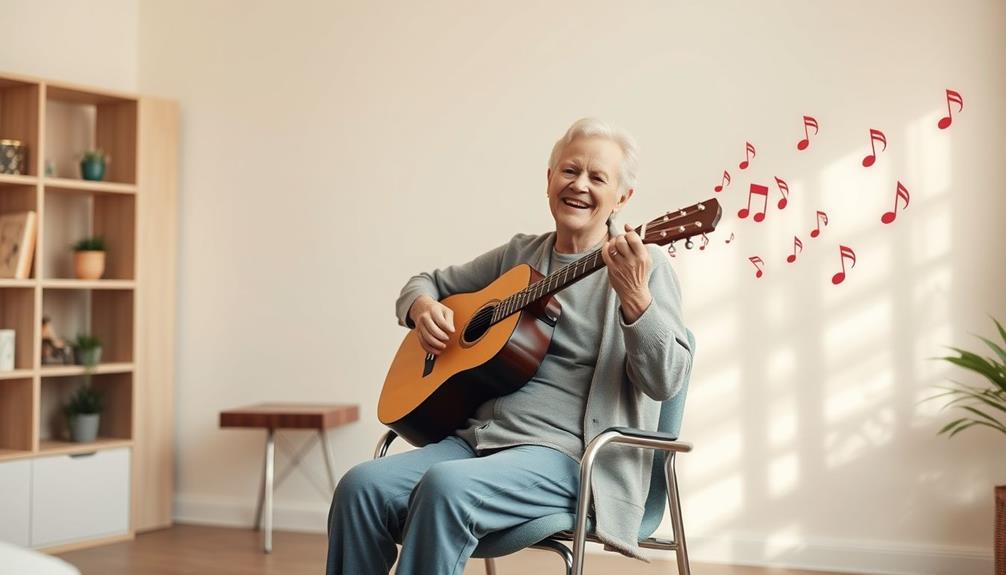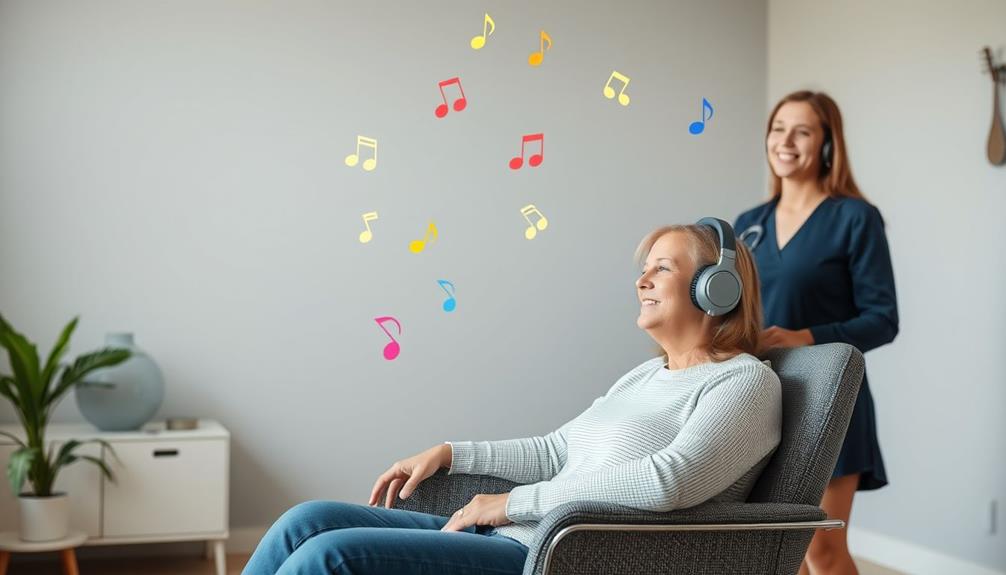Music therapy provides essential benefits for you if you're living with Parkinson's disease. It can improve your motor skills, enhancing movement and coordination through rhythmic stimulation. You'll likely notice better emotional well-being as music therapy helps lift your mood and reduce anxiety. Plus, participating in group sessions fosters connections with others, creating a supportive community. This therapeutic approach also aids speech and communication, allowing for greater expression. Engaging with music not only enriches your life but also opens new avenues for healing and connection. There's so much more to discover about its impact and benefits.
Key Takeaways
- Music therapy enhances motor skills, improving gait, balance, and coordination in individuals with Parkinson's disease.
- Emotional well-being is significantly boosted, reducing depressive symptoms and increasing overall quality of life.
- Communication skills improve through group singing and melodic intonation therapy, aiding in speech clarity.
- Social connections are strengthened as group activities promote emotional expression and reduce feelings of isolation.
- Personalized music therapy sessions maximize therapeutic benefits, addressing individual needs and treatment goals effectively.
Overview of Parkinson's Disease
Parkinson's Disease (PD) affects millions worldwide, with about 8 million people currently living with this progressive neurological disorder. It primarily impacts movement, manifesting through motor symptoms like tremors, rigidity, and bradykinesia. These symptoms typically surface between ages 50 and 60 and can severely compromise your quality of life.
As the disease progresses, many individuals face significant challenges, including emotional strains similar to those experienced during divorce proceedings, which can lead to increased feelings of isolation and stress.
Speech disorders are prevalent, affecting up to 89% of those with PD, making communication difficult and leading to social isolation. You might find that these changes not only impact your ability to express yourself but also your interactions with family and friends, heightening feelings of loneliness.
Current FDA-approved treatments, such as dopaminergic pharmacotherapy and rehabilitation, often fall short in addressing advanced PD symptoms. The challenges don't stop there; patients also experience a heightened risk of falls, further complicating daily life.
As you navigate this journey, it's essential to seek support and explore various strategies to manage the symptoms and maintain connections with loved ones, ensuring you can still enjoy life despite the hurdles that Parkinson's Disease presents.
Understanding Music Therapy

Music therapy is a powerful tool that uses music interventions to help you achieve specific therapeutic goals. Certified music therapists employ techniques like rhythmic auditory stimulation and songwriting to enhance your motor, cognitive, and emotional functions.
Research shows that engaging in music therapy can greatly improve motor symptoms and overall well-being for those living with Parkinson's disease. Additionally, incorporating physical activity, such as hiking and cardio for endurance, can further support the therapeutic benefits of music therapy.
Engaging with music not only fosters emotional connections but also encourages movement, which is vital for individuals with Parkinson's.
Definition and Techniques
A powerful therapeutic approach, music therapy harnesses the benefits of music creation, performance, and listening to support individuals facing the challenges of Parkinson's Disease (PD). This therapeutic method employs various techniques tailored to meet your specific health-related goals.
For instance, rhythmic auditory stimulation can help improve your gait, while melodic intonation therapy addresses speech disorders effectively. Additionally, incorporating body awareness techniques from somatic therapy can enhance the overall therapeutic experience, promoting a deeper mind-body connection during sessions.
Group singing is another technique that not only fosters social connections but also enhances emotional expression, creating a supportive environment for participants. Active music therapy, where you engage in music-making, has shown significant improvements in both motor and emotional functions among PD patients.
Music therapists, certified professionals, design sessions that integrate diverse musical activities, ensuring they align with your individual treatment goals. They utilize evidence-based practices that combine clinical knowledge with creativity, optimizing patient care through collaboration with other healthcare providers.
With these tailored techniques, music therapy can be a crucial component of your treatment plan, providing a unique and engaging way to enhance your quality of life while managing the challenges of Parkinson's Disease. In addition to the therapeutic benefits of dancing, music therapy can also help improve motor skills, decrease anxiety, and promote relaxation. By incorporating rhythm and movement, individuals with Parkinson’s Disease can experience improved coordination and balance, leading to a greater sense of independence and confidence. With the guidance of a trained music therapist, you can explore the powerful connection between music and movement, finding joy and fulfillment in each session.
Therapeutic Benefits Overview
Therapeutic benefits of music therapy for individuals with Parkinson's Disease are significant and multifaceted. This innovative approach combines various techniques, such as rhythmic auditory stimulation and group singing, to enhance both emotional well-being and motor skills.
You might find that engaging in music therapy leads to remarkable improvements in several areas:
- Gait improvement: Music therapy can help remodel sensorimotor rhythms, enhancing movement and coordination. Additionally, incorporating essential oils like peppermint oil can provide a cooling effect and stimulate overall wellness during therapy sessions, further enhancing the experience essential oils for overall wellness.
- Motor skills: Regular sessions can boost your overall motor function and balance.
- Anxiety reduction: Participation in music therapy is linked to decreased anxiety and depressive symptoms.
- Quality of life: The positive impacts on emotional health contribute to a better overall experience living with Parkinson's disease.
- Group singing: These sessions can improve vocal loudness and clarity, addressing speech disorders that affect many individuals with PD.
In essence, music therapy not only targets the physical aspects of Parkinson's disease but also nurtures emotional connections and social interactions, paving the way for a fulfilling life.
Embracing this therapeutic modality can truly enhance your journey with PD.
Evidence and Research Findings
Research shows that music therapy can greatly impact individuals with Parkinson's disease, particularly in improving motor skills and emotional well-being. A systematic review of studies from 2010 to 2022 analyzed 78 research articles, including 46 peer-reviewed articles, revealing notable gait improvement and reductions in speech deficits among patients.
Randomized control studies indicated that music therapy considerably enhances gait metrics, such as speed and cadence. As the demand for innovative therapies grows, the integration of AI ethics education into healthcare practices may provide additional frameworks for understanding patient responses to such interventions.
Techniques like rhythmic auditory stimulation and melodic intonation therapy have shown notable benefits in addressing both motor skills and speech disorders in those with Parkinson's disease. These approaches harness the power of rhythm to aid movement and communication, making them essential tools in therapy.
Furthermore, research highlights that music therapy contributes positively to emotional well-being, helping to reduce depressive symptoms in patients. However, responses to music therapy can vary considerably, which may be linked to individual synchronization abilities with rhythmic cues.
This variability suggests that personalized approaches in therapy sessions are vital for maximizing the benefits of music therapy for each individual with Parkinson's disease. Overall, the evidence underscores the effectiveness of music therapy as a valuable intervention.
Research Evidence and Findings
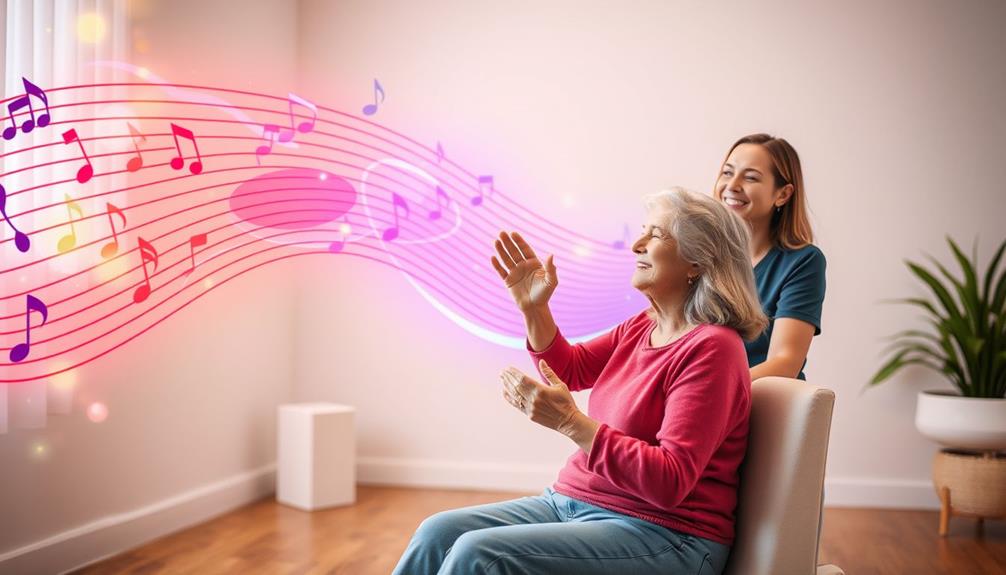
Research shows that music therapy can markedly enhance motor functions and emotional well-being in people with Parkinson's Disease.
Techniques like rhythmic auditory stimulation are a prime example of how AI-generated music influences ownership debates in the industry and lead to immediate improvements in gait and speech.
Enhanced Motor Functions
Utilizing music therapy has shown remarkable potential in enhancing motor functions for individuals with Parkinson's disease. Techniques like rhythmic auditory stimulation play an essential role in improving gait patterns and balance by remodeling sensorimotor rhythms in your brain.
Additionally, just as certain dog breeds, like the Dalmadoodle, exhibit unique characteristics and benefits, music therapy can tailor its approach to meet individual needs.
Research highlights the effectiveness of music therapy in various ways:
- Improved Gait Patterns: Regular exposure to rhythmic auditory stimulation can lead to significant gait improvement.
- Enhanced Balance: Treadmill-based musical rehabilitation has demonstrated notable advancements in balance for Parkinson's patients.
- Increased Adherence: A study noted a 97% adherence rate among participants engaging in musical contingent gait training, showcasing its practicality.
- Reduced Freezing of Gait: Rhythmic auditory stimulation can help restore internal synchronization, alleviating symptoms related to freezing of gait.
- Motor Automaticity: Wearable devices used in musically contingent training have been linked to increased motor automaticity, contributing to better movement.
Improved Emotional Well-Being
Music therapy greatly enhances emotional well-being for individuals with Parkinson's disease. Research shows that engaging in music therapy can markedly improve mood and reduce depressive symptoms, leading to a better quality of life. Through activities like group singing, you can experience emotional ventilation and psychological stability, which helps improve your self-perception.
Additionally, managing daily headaches during pregnancy highlights the importance of emotional support in health management, reflecting a similar benefit found in music therapy.
Music therapy also aids in processing the emotional impact of a Parkinson's diagnosis. This can lead to anxiety reduction and enhanced emotional expression, allowing you to confront your feelings more openly. Regular participation in these sessions boosts motivation and provides essential emotional support, fostering a more positive outlook on life.
Moreover, studies indicate that music therapy promotes effective mood regulation, enabling you to manage your emotions better. This not only helps with immediate emotional challenges but also encourages lifestyle changes that further enhance your emotional well-being.
Music Therapy's Impact on Motor Skills

Through innovative techniques, music therapy has emerged as a powerful tool for enhancing motor skills in individuals with Parkinson's disease. By incorporating rhythmic auditory stimulation (RAS), music therapy programs work to improve motor functions, including gait improvement and balance.
Additionally, practices such as gentle yoga stretches before bedtime can complement music therapy, offering a holistic approach to managing symptoms. Studies reveal that participants experience significant enhancements in gait metrics, such as speed and cadence, following consistent music therapy interventions.
Here are some key benefits of music therapy for motor skills:
- Improved Gait Patterns: RAS helps restructure sensorimotor rhythms, facilitating smoother movement.
- Enhanced Balance: Music therapy promotes stability, reducing the risk of falls.
- High Adherence Rates: With a 97% adherence rate, participants find music therapy enjoyable and effective.
- Physical Rehabilitation Success: Treadmill-based musical rehabilitation showcases significant improvements in motor function.
- Safety: No falls reported during music therapy sessions highlight its feasibility for individuals with Parkinson's disease.
Enhancing Communication Through Music

Incorporating music therapy into the lives of individuals with Parkinson's disease can greatly enhance their communication skills. Through group singing activities, you can improve vocal loudness, pitch duration, and even swallowing control, all of which considerably boost your communication abilities.
Techniques like melodic intonation therapy and rhythmic speech cueing effectively address the speech disorders that impact up to 89% of those living with Parkinson's, making it easier for you to express yourself clearly. Additionally, engaging in auditory discrimination exercises can further support your ability to differentiate sounds and improve your speech clarity.
Music therapy also fosters emotional expression, allowing you to process your diagnosis and reducing anxiety. This, in turn, facilitates better communication with caregivers and loved ones. Engaging in these therapeutic activities often leads to improved self-confidence and richer social interactions, enhancing your overall communication experiences.
Moreover, using familiar music during therapy sessions can heighten enjoyment and motivation, further supporting your ability to express yourself both verbally and emotionally.
Emotional Well-Being and Music Therapy
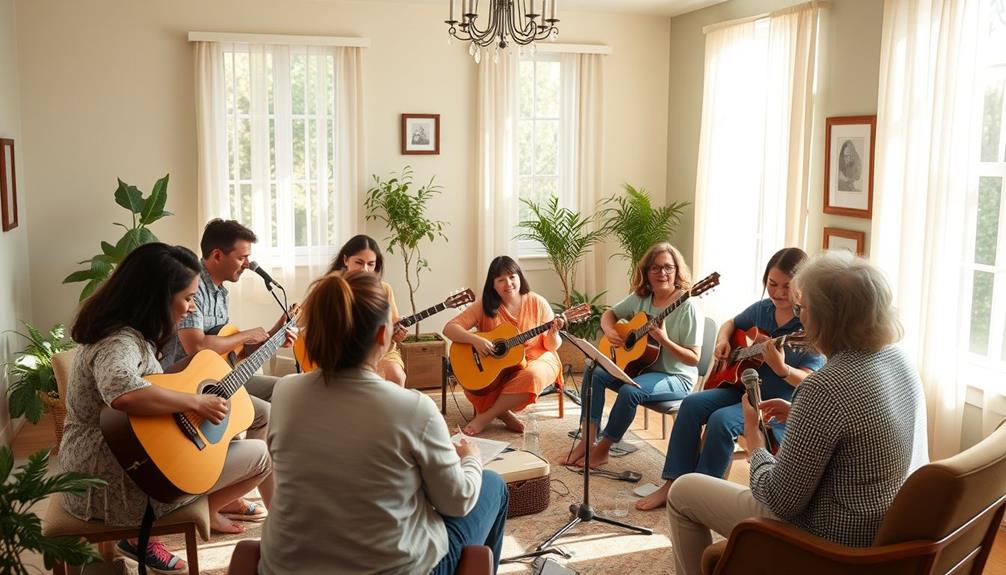
The power of music therapy can greatly uplift your emotional well-being if you're living with Parkinson's disease. This therapeutic approach has been shown to improve mood and decrease depressive symptoms, fostering resilience and enhancing your overall quality of life.
Engaging in music therapy not only helps you process your diagnosis but also reduces anxiety and promotes a sense of community.
Here are some key benefits of music therapy for your emotional well-being:
- Improved mood: Regular participation can lead to a significant boost in your mood.
- Anxiety reduction: Music therapy can help alleviate feelings of anxiety, making daily life more manageable.
- Mood regulation: This therapy assists you in managing your emotions effectively.
- Group singing: Joining group sessions fosters self-confidence and emotional expression.
- Enhanced psychosocial well-being: You'll find that music therapy addresses your critical emotional needs.
Social Connections via Music
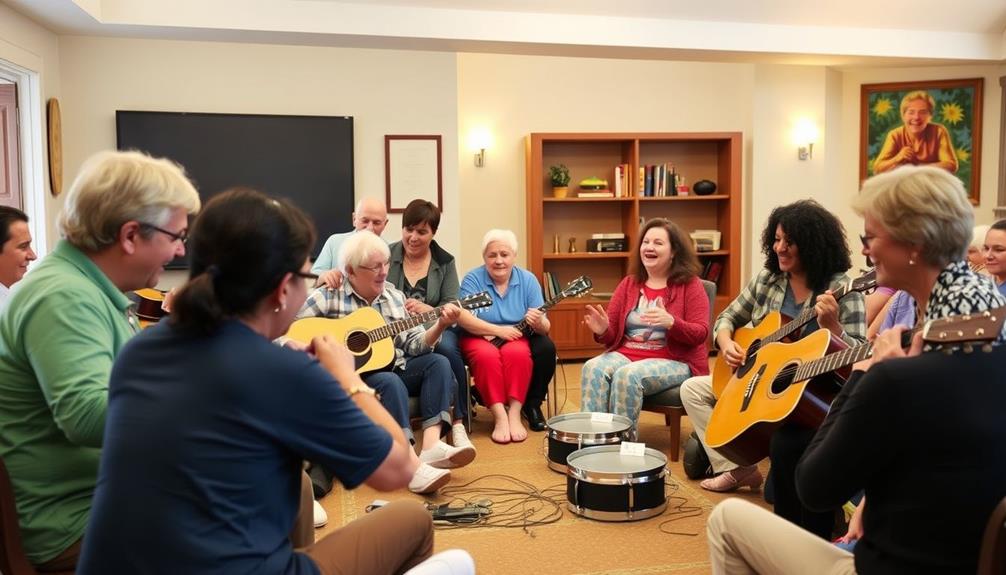
Music therapy not only boosts your emotional well-being but also plays an essential role in fostering social connections among individuals with Parkinson's disease. Engaging in group singing activities enhances emotional expression while reducing feelings of isolation. You'll find that these shared experiences foster community support and strengthen interpersonal bonds, leading to a better quality of life.
| Benefits of Music Therapy | Impact on Parkinson's Patients |
|---|---|
| Emotional Ventilation | Boosts self-confidence |
| Improved Communication Skills | Encourages social interaction |
| Enhanced Enjoyment | Increases participation |
Research shows that familiar music enhances motivation, making it easier for you to engage in group settings. As you participate in collaborative music-making, you'll not only improve your vocal abilities but also strengthen your social connections. This supportive community encourages emotional expression, helping you communicate more effectively. Ultimately, music therapy creates a sense of belonging, reminding you that you're not alone in your journey with Parkinson's Disease.
Community Resources for Support
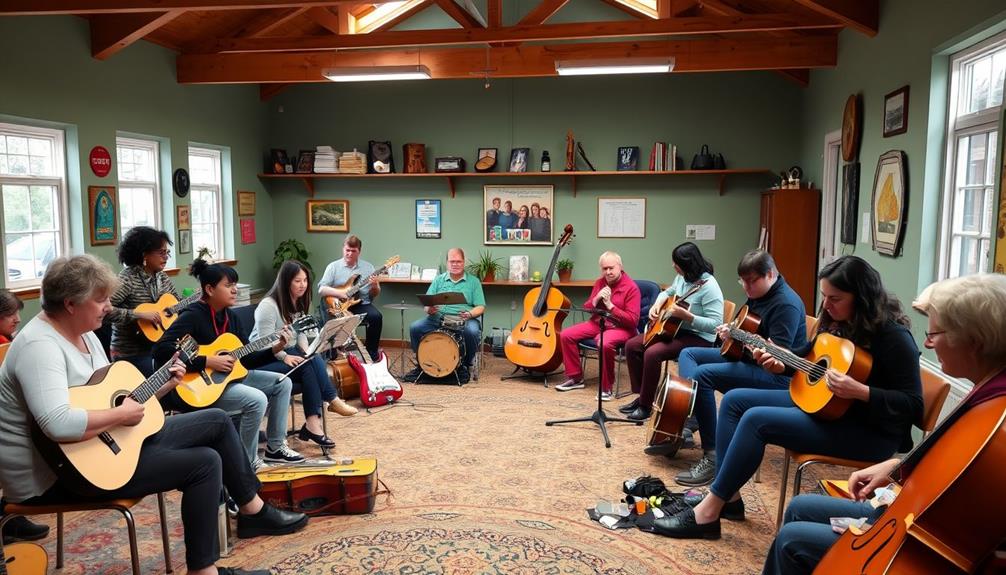
Finding community resources can be a game-changer when maneuvering through life with Parkinson's disease. Organizations like the American Parkinson Disease Association (APDA) offer invaluable support and information on local music therapy classes tailored for individuals with PD. Participating in these community music-based programs can help you experience the therapeutic benefits that music therapy provides.
Here are some community resources you should consider:
- APDA Chapters: Find local chapters that host music therapy sessions and programs.
- Dance Classes: Join specialized dance classes, like those offered by Pamela Quinn, focusing on creative movement for PD.
- Caregiver Resources: Access educational materials to support caregivers and families affected by Parkinson's.
- Community Engagement: Participate in community events that promote social connections through music and dance.
- Donations: Consider donating to the APDA to fund research and community initiatives related to music therapy.
These resources not only provide support but also foster connections and promote well-being for both individuals with Parkinson's disease and their caregivers.
Embracing these opportunities can enhance your quality of life and create a strong support network.
Future Directions in Music Therapy

As you explore community resources for support, it's important to look ahead at the future of music therapy in managing Parkinson's disease. Ongoing research is clarifying how music therapy influences gait performance, potentially linking it to enhanced basal ganglia and cerebellum activity. This understanding could lead to more effective neurological rehabilitation strategies tailored to individual needs.
One exciting avenue is the integration of telemedicine, which offers remote access to music therapy for patients in underserved areas. This approach not only improves access but also enhances symptom monitoring and allows for timely treatment adjustments.
Future studies aim to evaluate the long-term effectiveness of music therapy, focusing on its sustainability and overall impact on patient outcomes.
Additionally, research is moving toward personalized music interventions, considering each patient's unique ability to synchronize with rhythmic cues. This could greatly increase the efficacy of music therapy for diverse individuals with Parkinson's disease.
The exploration of music therapy's broader applications across various medical conditions also suggests its potential as a valuable tool in extensive PD management, complementing traditional therapies and improving quality of life.
Frequently Asked Questions
How Does Music Therapy Help People With Parkinson's?
Music therapy helps you enhance motor skills, improve vocal strength, and boost emotional well-being. Engaging with music fosters social connections, stimulates cognitive functions, and encourages emotional expression, making your experience more fulfilling and enriching overall.
What Is Neurologic Music Therapy for Parkinson's Disease?
Neurologic Music Therapy (NMT) uses music interventions to target neurological challenges you might face. It enhances movement, speech, and social connections, helping you improve motor skills and emotional well-being through engaging musical activities.
What Is the Best Thing to Do for Parkinson's Disease?
Imagine dancing in the sunlight, feeling every beat. For Parkinson's, the best thing you can do is stay active—exercise regularly, engage socially, and explore therapies that resonate with you, enhancing your life's rhythm.
Do Rhythmic Abilities and Musical Training in Parkinson's Disease Help?
Yes, rhythmic abilities and musical training can help you improve your motor functions. Engaging with rhythmic cues enhances your coordination and timing, making movement more automatic and reducing the chances of freezing during activities.
Conclusion
Incorporating music therapy into the treatment plan for Parkinson's disease can greatly enhance your quality of life. Research shows that up to 70% of participants experience improved motor skills and emotional well-being through music therapy. By engaging with music, you not only boost your physical abilities but also foster social connections and communication. As you explore these therapeutic options, remember that the healing power of music can truly transform your journey with Parkinson's.

